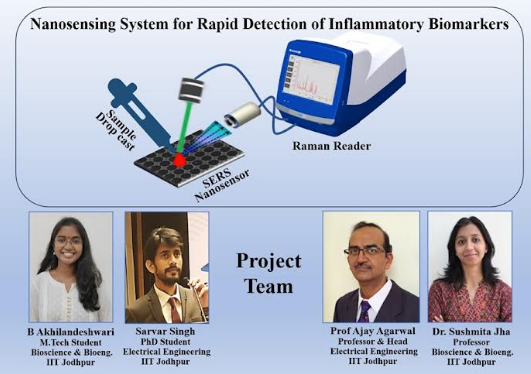IIT Jodhpur develops sensor to track disease progression & provide rapid medical support
April 08, 2024 | Monday | News
For developing therapeutics for conditions like Multiple Sclerosis, Diabetes, and Alzheimer's disease, among others
Researchers at the Indian Institute of Technology (IIT) Jodhpur have developed a nanosensor that helps in the quick detection of cytokines, a group of proteins that regulate various cells.
This development aims to reduce the mortality rate occurring due to delayed diagnosis and a lack of early warnings. Moreover, the technology has immense potential to be used as a rapid and point-of-care technique for health monitoring, disease diagnosis, prognosis, and immune response tracking.
Talking about the developed technique and its future scope, Prof. Ajay Agarwal, Department of Electrical Engineering, IIT Jodhpur, said, “This technique which is currently in its development stage has provided exciting and encouraging results for three biomarkers i.e. interleukin-6 (IL-6), interleukin-β (IL-β), and TNF-α which are key pro-inflammatory cytokines, released by inflammatory cells. As of now, the testing is done for controlled samples, but the team aims to take the technology to clinical trials soon. The group is also using this technique, to develop detection protocols for the early-stage and quick diagnosis of Sepsis and Fungal infections.”
This novel sensor uses Surface Enhanced Raman Spectroscopy to detect analytes even at low concentrations, and is based on semiconductor process technology and works on the principle of Surface Enhanced Raman Scattering (SERS).
The most widely used techniques currently for cytokine detection are enzyme-linked immunosorbent assay (ELISA) and polymerase chain reaction (PCR). These methods are reliable but highly time-consuming, requiring trained personnel and a long sample preparation or analysis time of over 6 hours. However, the sensor developed by IIT Jodhpur takes only 30 minutes in comparison and is also cost effective.
The developed sensor is used in conjuncture with artificial intelligence (AI) for quick and accurate data processing and analysis. By getting a faster and more robust diagnosis of a person’s autoimmune diseases and bacterial infections, this sensor possesses the capability to transform a patient’s medical treatment.









